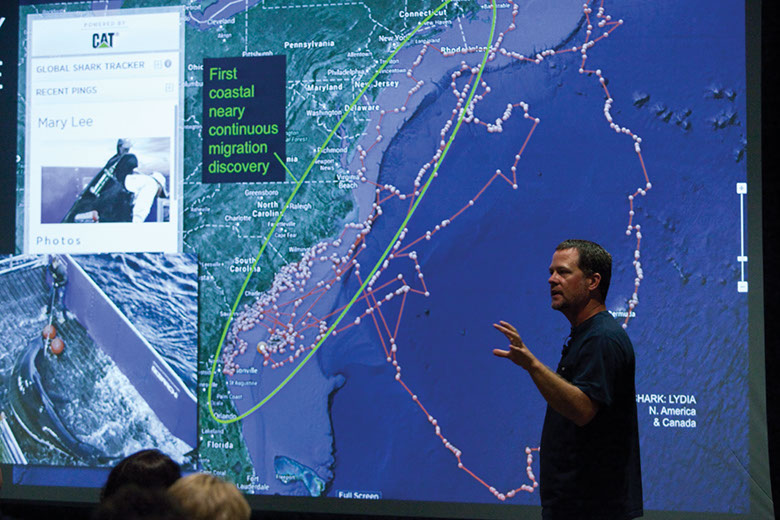Scientists, students and shark enthusiasts of all ages filled the seats of Cape Fear Community College’s Union Station Monday, Sept. 8 during a sold-out lecture from a modern-day marine rock star.
Chris Fischer, founding chairman and expedition leader of the shark research organization Ocearch, presented “Sharks: The Impossible is Possible,” reflecting on the challenges he and his company face, and elaborating on the data his expeditions acquire as a result of tagging sharks.
Ocearch uses a 126-foot research vessel and 75,000-pound custom lift to draw blood from and implant a shark’s dorsal with a Global Positioning System that “pings” or registers on a computer map whenever the fin surfaces. The data his team compiles has identified the first shark breeding and birthing sites in history.
“In five years we have tagged over 200 sharks — 80 of those great white — and scientists now know that female sharks have a two-year gestation period and are tracking their migration habits,” Fischer said.
The common thread that runs throughout Fischer’s story is perseverance in the face of seemingly impossible challenges. Fischer financed his first expeditions and the tagging technology entirely out of his own pocket, and a television contract with The History Channel was canceled after 10 episodes.
“Everyone in their life is going to have a great white shark, some impossible thing,” Fischer said. “You just have to believe that what you’re doing is right and find a way to overcome. My parents always told me to inch forward because an inch is a cinch.”
Fischer mentioned his parents often while telling the Ocearch story, and named his favorite great white shark, a 16-foot, 3,456-pound female after his mother, Mary Lee.
“I was always taught that inclusion is the only way to achieve success,” he said. “All of this data that we have assembled is open-source so that researchers can learn more about these creatures, and local PHDs can use the data to influence local governments to influence positive policy.”
The data Ocearch obtains is studied by more than 70 researchers from more than 35 institutions, with 50 research papers in progress. Ocearch also developed a curriculum of math, physics, biology, oceanography and chemistry from their investigations.
“We need people to spread this information because we lose 250,000 sharks every day,” Fischer said. “One hundred million will be killed this year, many for a bowl of soup in Asia. If we lose our oceans we lose our planet. If we lose our sharks we lose our ocean. If you remove the sharks, the squid explode like locusts or the plague and secondary predators eat all of the fish eating the reefs. You’ll have dead reefs and a dead ocean like you see in the Sea of Cortez.”
Fischer believes the Carolinas are a special place for sharks because of the brackish water, and showed the audience Mary Lee’s GPS tracking on two giant projection screens.
“Sometimes when I’m out on the water tagging, I wonder, ‘Is anybody out there besides researchers that are listening or connecting with our mission?’” Fischer said. “But, by coming here and speaking to this crowd, I am confident that we are on the right track.”
For more information on Ocearch and to track sharks like Mary Lee visit www.ocearch.org.
email [email protected]




